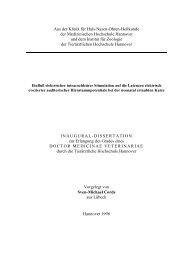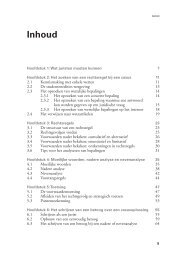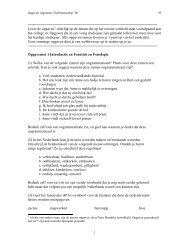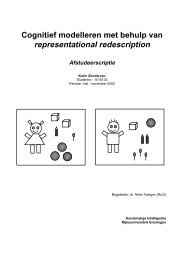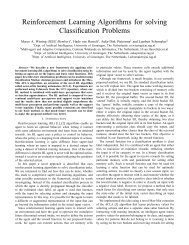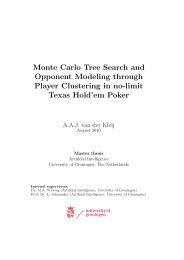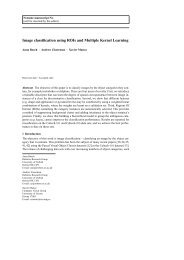Presuppositions in Spoken Discourse
Presuppositions in Spoken Discourse
Presuppositions in Spoken Discourse
You also want an ePaper? Increase the reach of your titles
YUMPU automatically turns print PDFs into web optimized ePapers that Google loves.
Chapter 5<br />
(10) factive, triggered p: Your scientist is go<strong>in</strong>g for question one (1-1 942) (LOCAL)<br />
Speaker B: And let‘s have your literature question, let‘s have it <strong>in</strong> the same position<br />
every time so that your scientist will know that he‘s go<strong>in</strong>g for question<br />
one, your literature person will go for question two and . they don‘t have<br />
to read the two *passages* and decide *.*#|<br />
Speaker A: **# **#|<br />
Speaker B is discuss<strong>in</strong>g his ideas for how an exam<strong>in</strong>ation could be improved to<br />
make it more relevant for students from the natural sciences (referred to as<br />
scientists, or as here, your scientist contrasted here with students from the liberal arts,<br />
your literature person) and the discussion beg<strong>in</strong>s several l<strong>in</strong>es previous to his<br />
statement. Future tense, as well as phrases such as let‘s have are all signals of the<br />
modal subord<strong>in</strong>at<strong>in</strong>g context.<br />
Global accommodation would lead to an <strong>in</strong>terpretation where the natural<br />
science student (your scientist) knows he/she is go<strong>in</strong>g for question one even before<br />
the new format for exam<strong>in</strong>ations has been mentioned, mak<strong>in</strong>g it a rather illogical<br />
choice. The entire discussion dist<strong>in</strong>guish<strong>in</strong>g questions for literature students from<br />
questions for natural science students. We understand from the earlier context (not<br />
presented here) that natural science students prefer to answer questions deal<strong>in</strong>g<br />
with non-fiction texts, and standardiz<strong>in</strong>g the order of questions will make it easier<br />
for these students to quickly f<strong>in</strong>d this question. The assertional mean<strong>in</strong>g of the<br />
sentence is that the scientist will be ‘aware’ of which question he is go<strong>in</strong>g for, and<br />
not that he will be go<strong>in</strong>g for an already exist<strong>in</strong>g question. Local accommodation<br />
could also be argued to be preferred because question one only exists with<strong>in</strong> this<br />
hypothetical discussion, there is no question one <strong>in</strong> the test as it is now, at least not<br />
with properties that the new version of the test will give question one. This also<br />
makes it a k<strong>in</strong>d of trapp<strong>in</strong>g. It may also be that the discussion of how the exam will<br />
be set up is sufficient for the discourse participants to <strong>in</strong>fer the existence of two<br />
questions, but <strong>in</strong> that case question one still refers to the question <strong>in</strong> the new format<br />
will be represented by a reference marker <strong>in</strong>troduced with<strong>in</strong> the hypothetical<br />
discussion.<br />
Other cases of presupposition triggered under embedd<strong>in</strong>g could be<br />
understood as cases of a k<strong>in</strong>d of implicit trapp<strong>in</strong>g. Example (11) below is an<br />
excerpt from a discussion concern<strong>in</strong>g the difference between signs and symptoms <strong>in</strong><br />
which the general usage of the terms is discussed. A hypothetical X-ray and what<br />
you could see <strong>in</strong> it is used as an example.<br />
(11) factive, triggered p: Th<strong>in</strong>gs are blocked up ‘<strong>in</strong> X-ray‘(2-9 1132)<br />
Speaker B: Signs are the only th<strong>in</strong>gs you can observe, like if you took an X-ray and<br />
saw that th<strong>in</strong>gs were blocked up or someth<strong>in</strong>g.<br />
There is only one level of explicit embedd<strong>in</strong>g created by the if, so only global and<br />
local accommodation are available. Possible <strong>in</strong>terpretations for global and local<br />
accommodation are the follow<strong>in</strong>g:<br />
108



